Pliny the Elder (2)
Pliny the Elder or Gaius Plinius Secundus (23-79): Roman officer and encyclopedist, author of the Natural History.
Scholar
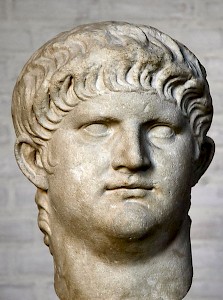
When Pliny returned to Rome in 59, he was thirty-six years old, a reliable officer in search for a new occupation. A procuratorship would have been possible. However, this did not happen. We do not know why. Of course, his patron Pomponius was dead, but Pliny was a veteran officer and had published two important books on military matters and a biography, so it is not exaggerated to say that he was "someone". He did not really need a patron to proceed his career.
The real reason must have been a change in the political climate. Claudius was by now dead, Nero was in the fifth year of his reign, and other rules applied. Under the old emperor, historians had been welcome, but Nero was more interested in musicians, singers, dancers, and other performers. 59 was the year in which Nero disgraced himself by giving a recital - something a member of a royal family simply was not supposed to do. This was not the kind of court in which the serious veteran could play a role.
Perhaps, Pliny understood that worse was to come. A performing emperor was not only a disgrace to his high office, but also a danger to the quality of government. There were rumors that Nero had murdered his mother. Pliny must have known that he was not the man to cope with this type of situation. He retired from public life - after all, he was a wealthy man - and devoted his talents to the study of literature. The result is described by Pliny the Younger: three books.
The Scholar - three volumes divided into six sections on account of their length, in which he trains the orator from his cradle and brings him to perfection.
Problems in Grammar - eight volumes; this he wrote during Nero's last years when the slavery of the times made it dangerous to write anything at all independent or inspired.
A Continuation of the History of Aufidius Bassus - thirty-one volumes.note
As the younger Pliny seems to admit, these were not "independent or inspired" works. The Scholar was a haphazard collection of incidents and suggestions, which was quoted ironically by the great rhetorician Quintilian, and forgotten. The same fate befell the works of the man who had taught Pliny rhetoric, Pomponius Secundus. The style of writing of Pliny and his master were considered strange, and we may assume that this is why the Problems in Grammar have suffered the same fate.
The Continuation of the History of Aufidius Bassus must have dealt with the years after 47 (the year in which Pliny had taken part in the campaign against the Chauci), and left unfinished when Nero died. This was the last of Pliny's works; it was published after his death.
Meanwhile, Pliny had become uncle. His sister Plinia had given birth to a son, Gaius Caecilius Secundus (62). Unfortunately, the boy's father Lucius Caecilius died soon after, and Pliny, who had no wife and children, would adopt his nephew (posthumously). As was usual, the young men would adopt his uncle's name and become known as Gaius Plinius Caecilius Secundus, or, to use his English name, Pliny the Younger. He was educated in his uncle's Roman house.
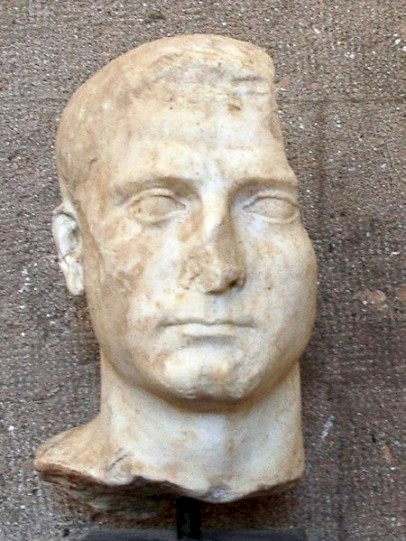
In the meantime, the political situation was deteriorating. Nero was becoming more and more of a tyrant and many people were killed, or forced to commit suicide, as was the fate of Corbulo, the general whom Pliny had served. In 68, the governor of Gallia Lugdunensis, Gaius Julius Vindex, revolted, but the general of the army of the middle Rhine, Lucius Verginius Rufus (a friend of Pliny), suppressed the rebellion. However, the Senate declared that Nero was an enemy of the state and proclaimed Servius Sulpicius Galba, an ally of Vindex, emperor. Nero committed suicide.
This was the beginning of a terrible civil war. Galba despised the soldiers of the Rhine army, who first offered the throne to Verginius Rufus (who refused) and then to the general of the army of the lower Rhine, Aulus Vitellius. Galba panicked, made mistakes, and was lynched by soldiers of the imperial guard, which placed a rich senator named Marcus Salvius Otho on the throne, but he was defeated by the army of Vitellius. He had only just reached Rome, when the news arrived that in the east, where the Romans were fighting a war against the Jews, another general had revolted: Vespasian, the father of Pliny's friend Titus. The armies of the Danube immediately sided with the new pretender and defeated Vitellius' army.
All this happened in 69. A very incomplete incomplete inscription from Aradus suggests that Pliny was in the east, perhaps serving as Titus' comrade in arms. His description of the valley of the river Jordan may betray autopsy. On the other hand, it is possible that he was in the city. If so, he must have heard eyewitnesses about the death of Galba, he must have seen how Vitellius entered Rome, he must have seen how the Capitol was afire. This must have been the subject matter of the Continuation of the History of Aufidius Bassus, and it is likely that Pliny's history influenced his younger contemporary Tacitus.
Procurator and prefect
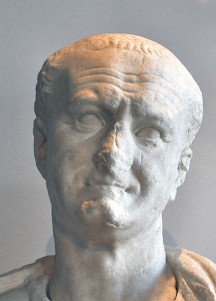
Because he was a friend of the new emperor and his son Titus, Pliny suddenly could embark upon a spectacular career: he obtained several procuratorships, which took him through the entire western part of the Roman world. In 70, he was in Gallia Narbonensis, in 72 in Africa, in 73 in Hispania Terraconensis, and in 75 in Gallia Belgica. During the two first jobs, Pliny was not only responsible for the emperor's personal possessions and finances, but also for the administration of justice. During the two last procuratorships, Pliny was responsible for all taxes of his provinces.
He was never in Rome and cannot have done much for the education of his nephew. A guardian was appointed: Verginius Rufus, the man who in 68 had refused the throne. To him, there was no chance upon a further career, and he founded a literary salon. It had several important members, such as the famous orator Nicetes of Smyrna, who became the younger Pliny's teacher in Greek and rhetoric.
On his return from Gallia Belgica, where he must have interviewed people who had witnessed the Batavian revolt (69-70), Pliny must have finished the Continuation of the History of Aufidius Bassus. Perhaps the work was dedicated to the emperor, because Pliny now belonged to the emperor's advisory council and had a function in the imperial palace. We do not know his function, but the prefecture of the fire brigade (the vigiles) is a possibility. The younger Pliny, who seems to have been living in the elder Pliny's urban residence, was impressed:
He would rise half-way through the night; in winter it would often be at midnight or an hour later, and two at the latest. Admittedly, he fell asleep very easily, and would often doze and wake up again during his work. Before daybreak he would visit the emperor Vespasian (who also made use of his nights) and then go to attend to his official duties. On returning home, he devoted his spare time to his work. After something to eat (his meals during the day were light and simple in the old-fashioned way), in summer when he was not too busy he would often lie in the sun, and a book was read aloud while he made notes and extracts. He made extracts of everything he read, and always said that there was no book so bad that some good could not be got out of it.
After his rest in the sun he generally took a cold bath, and then ate something and had a short sleep; after which he worked till dinner time as if he started on a new day. A book was read aloud during the meal and he took rapid notes.note
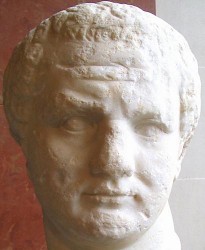
The next stage in Pliny's career was a military function again: he was made prefect of one of the two Roman fleets. It was stationed at Misenum, and Pliny was responsible for the safety of the Tyrrhenian Sea (although the sailors were also a kind of reserve army). He must have been a terribly busy man, but he was able to finish an encyclopedia, the Natural History, which contained all knowledge he had, both from reading and from autopsy. It was dedicated to his friend Titus, and was
written for the masses, for the horde of farmers and artisans, and, finally, for those who have time to devote time to these pursuits.note
We will discuss this work, which was published in 77, below.
Death
In August 79, Pliny's sister and her son were staying with him at Misenum, when the Vesuvius became active. On the twenty-fourth, after he had been out in the sun and had taken a bath, Plinia drew the admiral's attention to the umbrella-shaped cloud. Pliny the Younger says:
My uncle's scholarly acumen saw at once that it was important enough for closer inspection, and he ordered a fast boat to be made ready, telling me I could come with him if I wished. I replied that I preferred to go on with my studies, and as it happened he had given me some writing to do.note
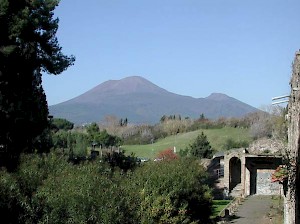
However, the admiral changed his mind. What had begun in a spirit of inquiry, became a humanitarian mission. He gave orders for the warships to be launched, so that the people from the towns around the volcano could be evacuated. But it was impossible to reach the far side of the bay, and Pliny landed at Stabiae, where he spent the night with a friend named Pomponianus. However, he died during the evacuation; the exact cause of his death is unknown, but it seems that he was asthmatic and overcome by the sulphurous fumes.
In this way the elder Pliny died. His nephew erected a literary epitaph, when he wrote:
The fortunate man, in my opinion, is he to whom the gods have granted the power either to do something which is worth recording or to write what is worth reading, and most fortunate of all is he who can do both. Such a man was my uncle.note